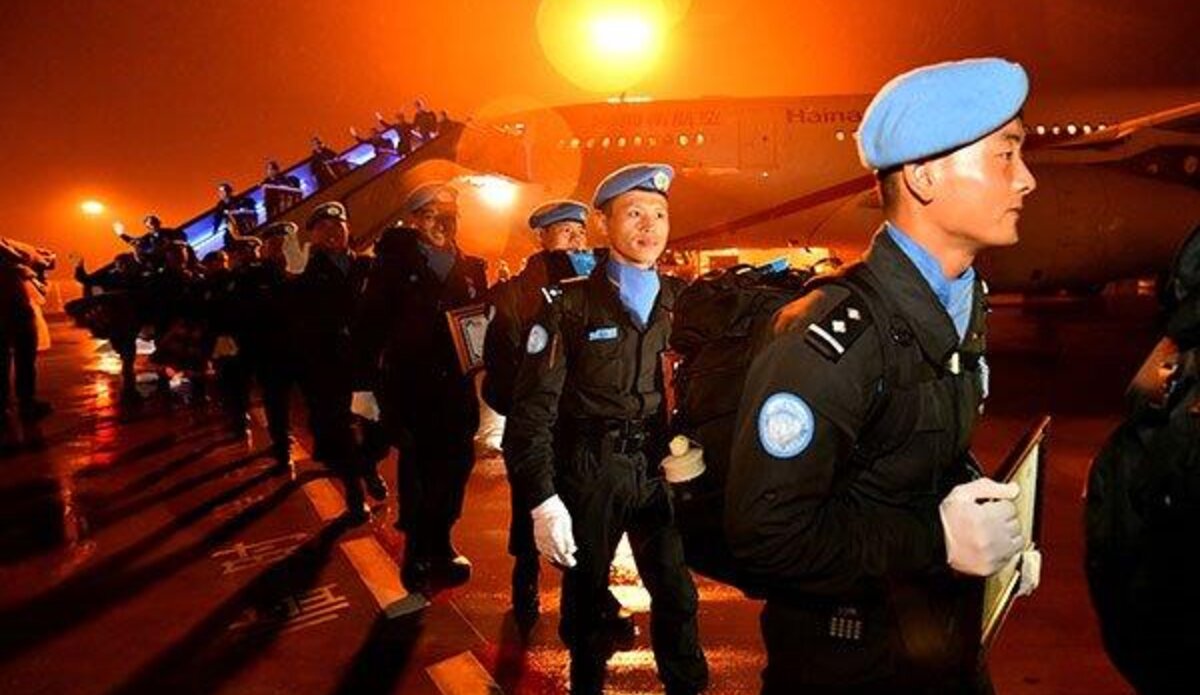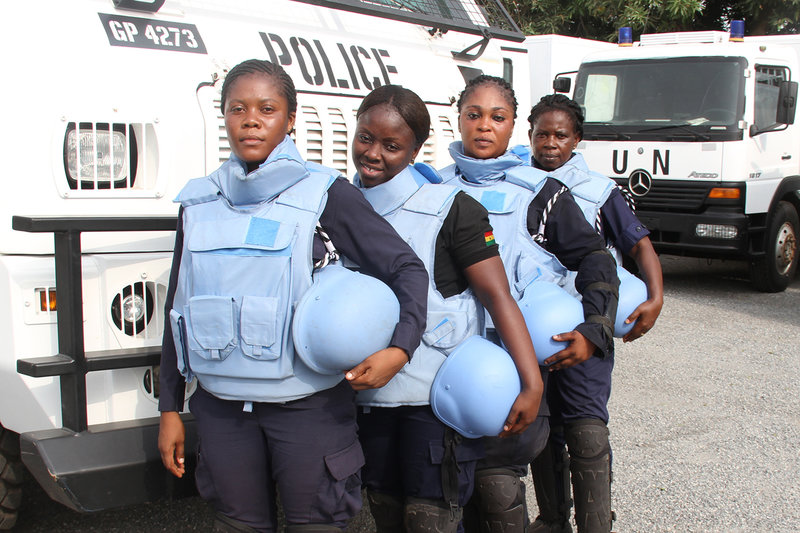Based on the decision by the United Nations Security Council on the strength of the police component and Formed Police Units, Member States are informed by the Police Division about the need for Formed Police Units, including specialized equipment or tasks they are expected to perform. These can include SWAT units, riverine units, language capabilities or demand for specific equipment.
Process
Based on the request, Member States can pledge a unit and subsequently report to the Police Division with a reconnaissance report, based on which a Memorandum of Understanding is drafted and signed. In parallel Member States train the unit and procure the necessary equipment so the unit can be self-sustaining for one year. Upon arrival, the mission determines an induction training for the formed police unit.
Generation
1. Call for contribution:
Based on preliminary consultations, and upon approval of a UN Security Council Resolution authorizing the participation of FPUs in a particular UN Mission, the Department of Peace Operations sends a Note Verbal to concerned Member States requesting them to confirm their willingness to contribute with FPUs to a particular UN operations. The Note Verbal is initially faxed and the original follows via mail.
2. Deployment Approval:
Once DPKO receives the confirmation from the Police Contributing Country (PCC), the approval of the deployment will be considered taking into account, among others, the following criteria:
- Operational readiness for deployment.
- Geo-political or regional considerations
- Agreement/Acceptance from the Host Country
- Already present unit/s from the PCC under any non UN arrangements (bilateral support/assistance missions etc).
It is strongly recommended that at this stage, pre-departure preparations are initiated, such as: pre-deployment training and seminars, medical clearance and immunizations, acquisition of passports and required visas, issuance of necessary logistical supplies.
3. Memorandum of Understanding:
Following the Approval for deployment, a Memorandum of Understanding (MOU) between the UN and the Police Contributing Country will be negotiated within the Contingent Owned Equipment system (COE) described in the COE manual. Representatives from the Police Division will represent the United Nations in these negotiations along with representatives from DFS.
4. Pre-deployment preparedness (Reconnaissance Visit / PDV/ FPAT):
When the UN has accepted the contribution of a PCCs, the PCC can be authorized for an Early Reconnaissance Visit to the mission area. The purpose of the visit is to determine how the conditions on the ground directly affect the contingent’s capability in undertaking the tasks assigned to them in the Mission Concept of Operations (CONOPs). Details regarding the role and composition of the delegation as well as the duration of the visit are detailed in Standard Operating Procedures on “Planning and Implementing Contributing Country Reconnaissance Visits (2005)”.
When the PCC confirms its readiness to deploy the FPU, UN Headquarters will deploy a team of experts led by the Police Division comprising representatives from the Department of Operational Support (DOS) and the field mission to assess the overall readiness of the unit to be deployed. The aim of this Pre-Deployment Visit (PDV) is to inspect the materials and equipment of the unit and verify its conditions to meet the mission’s Force Requirement and the negotiated MOU.
In addition to the inspections of the equipment, the team also assesses the operational readiness of the personnel; this operational assessment is called Formed Police Assessment Team (FPAT). Prior to the arrival of the PDV/FPAT to the PCC, the Police Division will receive through the PM the list of the FPU personnel to be assessed during the visit. The list of candidates should contain the following personal data of the candidates:
- rank,
- first name,
- last name,
- gender,
- date of birth,
- date when joined active police service,
- passport/national ID/police ID number,
- function within the unit and
- remarks about possible previous deployment to the UN.
Each nomination should also include a certification (preferably in a cover letter/note) that the candidates have not been convicted of and is not currently under investigation or being prosecuted for any criminal, human rights or disciplinary offence, with the exception of minor traffic violations (driving while intoxicated or dangerous or careless driving are not considered minor traffic violations for this purpose). See the sample Note Verbale listing the certification requirements.
Only FPUs who have successfully completed the FPAT assessment can be deployed to a peacekeeping mission. Similarly such operational assessment must be conducted before any subsequent rotation of FPU personnel at least 30 days prior the deployment date. The PCC will medically clear the members of the FPU before deployment.
5. Mission Deployment:
Upon satisfactory completion of the PDV, the UN will be responsible for arranging the transportation of the Contingent Own Equipment (COE) to the mission area. The transportation will be conducted in accordance with the UN regulations established as per the UN-COE manual, and depending on operational requirements it can be conducted either by land, air or sea.
The FPUs are deployed with the entire equipment considered necessary to meet the Mission’s operational requirements in accordance with the Force Requirement List prepared for the Mission along with the personnel. All equipments, weapons and ammunitions deployed to the Mission should be in accordance with internationally recognized standards for equipment for law enforcement agencies, and the list of Authorized Equipment for FPUs prepared by the Head of Police Component.
The PCCs must submit the passenger list (see II.5.F) and cargo load list, detailing all lethal and non-lethal weapons including ammunition to the Department of Operational Support (DOS) at UN Headquarters in order to ship the COE and transport the personnel of the FPU in accordance with the “TCC-PCC Deployment Planning Resource”.
The UN will in accordance with the specific directives issued by Head of Police Component (Police Commissioner) inspect the equipment upon arrival to the Mission to ensure it is in accordance with the list agreed with UN.
On initial deployment of the Unit, and upon satisfactory completion of the PDV and the FPAT assessment, the United Nations Headquarters provides the Permanent Mission with details of date of cargo collection and deployment of personnel. In the case of initial deployment an advance party composed mainly by support element, up to 10% of the unit’s strength, may be authorized in order to meet the arrival of the COE, prepare basic camp structures in view of the arrival of the main body. Members of FPUs arriving in the mission shall be required to sign an undertaking to comply with the UN Mission Guidelines, standard operating procedures, policies, and directives as issued by the United Nations and briefed accordingly.
6. Rotation:
Though according to the FPU Policy the recommended tour of duty (TOD) for FPUs is minimum six months and not more than one year, the Police Division strongly recommends that PCCs consider the TOD of the FPUs between nine months and up to one year.
Frequent rotations, in fact, have a significant impact on both the operational capability of the unit as well as administrative and economical considerations. Before any rotation and subject to the intimation of readiness of the unit through the Permanent Mission, a FPAT visit will be conducted in order to assess the operational readiness of the personnel to be deployed.
Prior the arrival of the FPAT to the PCC, the Police Division will receive through the PM the list of the FPU personnel to be assessed during the FPAT visit. The list of candidates should contain the following personal data of the candidates: rank, first name, last name, gender, date of birth, date when joined police and function in the unit.
Each nomination should also include a certification (preferably in cover letter/note) that the candidates have not been convicted of and is not currently under investigation or being prosecuted for any criminal, human rights or disciplinary offence, with the exception of minor traffic violations (driving while intoxicated or dangerous or careless driving are not considered minor traffic violations for this purpose).
7. Extension:
The United Nations always abide and respect the normal TOD for FPUs, however in exceptional circumstances FPUs might be extended beyond their normal TOD, thus attending issues of Operational Requirements on the part of the UN or responding to matters of national interest.
UN Peacekeeping Capability Readiness System (PCRS)
The UN Peacekeeping Capability Readiness System (PCRS) aims to establish a more predictable and dynamic process of interaction between the UN Headquarters and Member States for strengthening readiness and timely deployment of peacekeeping capabilities with the right quality. It collects pledges of formed police units, as well as military contingents.


